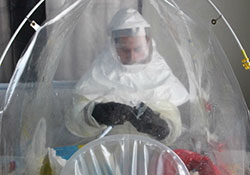Outbreak support

WHO/Pierre Desloovere
Laboratories are often on the front lines when it comes to responding to outbreaks. Laboratory networks in the WHO European Region played a key role in responses to, among others, the 2014 Ebola crisis in West Africa, the 2010 outbreak of poliomyelitis in central Asia, and the ongoing outbreaks of Middle East respiratory syndrome coronavirus and avian influenza A(H7N9).
Outbreak response includes ensuring that laboratories have the capacity to rapidly and correctly identify the pathogenic cause of an outbreak that is of potential public health concern, and to swiftly communicate their findings to the appropriate contacts in order to support control measures.
A recent outbreak requiring laboratory support was the Zika virus outbreak, which was formerly a public health emergency of international concern (PHEIC). WHO responded to the PHEIC by developing laboratory testing algorithms to guide testing in different contexts.
WHO/Europe also identified collaborating centres and reference laboratories that could receive specimens from the Region for testing. Specimens were sent using guidelines from the WHO publication “Guidance on regulations for the transport of infectious substances 2015–2016” by shippers who had completed the WHO Infectious Substances Shipment Training course.
Additionally, WHO identified sources of diagnostic reagents to enable testing at the national level, and put in place the WHO Emergency Use Assessment and Listing (EUAL) procedure to expedite the availability of commercial testing kits.



